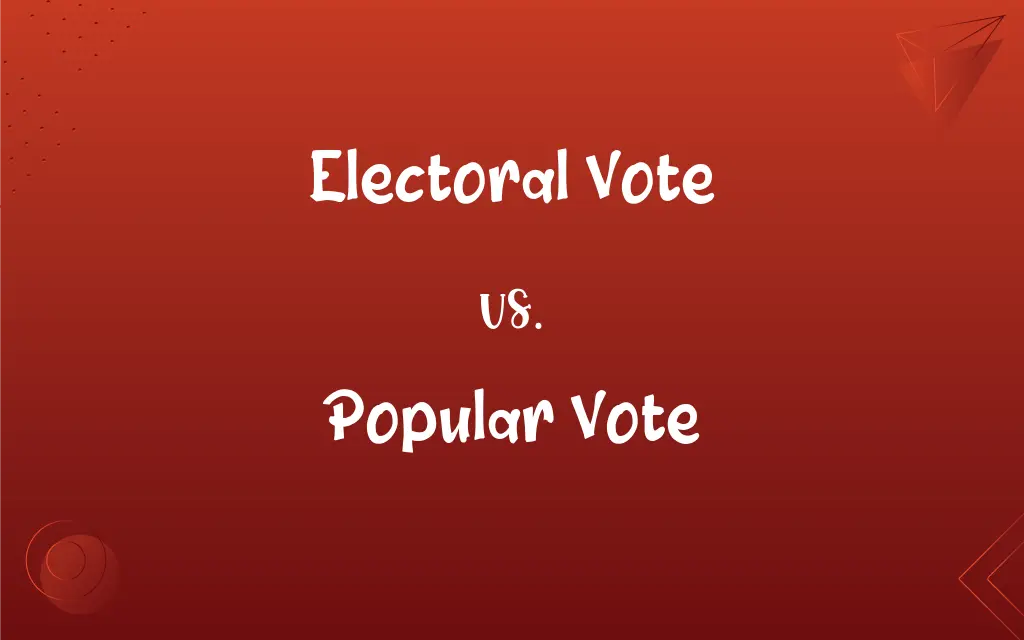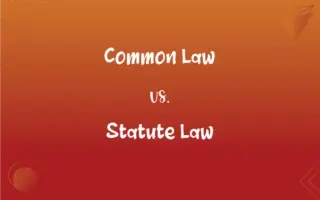Electoral Vote vs. Popular Vote: What's the Difference?
Edited by Aimie Carlson || By Harlon Moss || Updated on October 9, 2023
Electoral vote refers to votes cast by electors in the Electoral College, while popular vote means the total direct votes cast by citizens in an election.

Key Differences
The electoral vote is a fundamental component of the United States Presidential Election, instrumental in ultimately deciding who assumes the presidency. The popular vote, conversely, reflects the raw, unfiltered voice of the electorate, demonstrating the direct preference of the voting populace.
Within the electoral vote system, states are apportioned a specific number of electors, directly influenced by the state's total Congressional representation. In stark contrast, the popular vote encompasses every single ballot cast by voters, providing a straightforward, numerical insight into public preference regarding candidates.
Intricacies of the electoral vote mean that a candidate aims to win specific states, not individual voters, to accumulate electors and ascend to presidency. The popular vote, however, illuminates the pure, democratic expression of the nation, showcasing, in unequivocal numbers, which candidate the majority of voters prefer.
A scenario where the electoral vote is not perfectly mirrored by the popular vote is not only possible but has been historically observed. The popular vote may tilt towards one candidate, yet the distribution of electoral votes, shaped by victories in particular states, might favor the other.
Critics often highlight that the electoral vote can potentially overshadow the popular vote, allowing a candidate to ascend to presidency without securing the majority of direct, individual votes. The discrepancy between the electoral and popular vote continues to spur debates about the democratic fairness and relevance of the Electoral College.
ADVERTISEMENT
Comparison Chart
Definition
Votes cast by electors in the Electoral College.
Total number of direct votes cast by citizens.
Determination
Decided by winning states, not individual votes.
Direct reflection of individual voter preference.
Influence on Outcome
Directly determines the winner of U.S. Presidential Election
Can be different from the outcome of the election
Distribution
Distributed based on state populations and representation.
Accumulated nationally, without state divisions.
Significance
Ultimately decides the U.S. President.
May not align with final election outcome.
ADVERTISEMENT
Electoral Vote and Popular Vote Definitions
Electoral Vote
Electoral votes are cast by electors who are chosen based on the popular vote in each U.S. state.
The candidate must secure a majority of the electoral vote to win the presidency.
Popular Vote
The popular vote is often cited in discussions regarding the legitimacy and democratic nature of electoral outcomes.
Discrepancies between the popular vote and electoral vote outcomes spark debates about the U.S. electoral system’s fairness.
Electoral Vote
The number of electoral votes per state correlates with its Congressional representation.
Texas has 38 electoral votes, reflecting its substantial population and political weight.
Popular Vote
The popular vote within a state generally determines how its electors should vote.
Typically, if a candidate wins the popular vote in a state, they receive all its electoral votes.
Electoral Vote
A “faithless elector” refers to an elector who votes contrary to the popular vote in their state.
Faithless electors are rare and often subject to penalties, as their electoral vote contradicts the will of their state’s voters.
Popular Vote
The popular vote can be understood as the direct, democratic expression of voting citizens.
Critics argue that the popular vote should be the determining factor in electoral outcomes to uphold democratic principles.
Electoral Vote
The electoral vote ultimately determines the U.S. presidential winner, regardless of the national popular vote.
In 2000, George W. Bush won the electoral vote and thus the presidency, despite losing the popular vote.
Popular Vote
The popular vote is the total number of votes directly cast by voters in a presidential election.
The 2020 U.S. election saw Joe Biden win the popular vote by over 7 million votes.
Electoral Vote
The Electoral College comprises 538 electors, with 270 electoral votes needed to secure the presidency.
Presidential candidates strategize their campaigns to win a winning combination of states that yields at least 270 electoral votes.
Popular Vote
Winning the national popular vote does not guarantee a U.S. presidential victory.
Al Gore won the popular vote in 2000 but did not become president due to the electoral vote distribution.
FAQs
What is an electoral vote?
An electoral vote refers to the votes cast by members of the Electoral College, which directly determine the winner of a U.S. presidential election.
What is the Electoral College?
The Electoral College is a group of representatives chosen by voters to formally elect the U.S. President.
How many electoral votes are there?
There are 538 electoral votes in total.
How are electoral votes allocated to candidates?
Generally, the candidate with the most popular votes in a state wins all its electoral votes – a method known as the “winner-take-all” approach.
How often are electoral and popular votes conducted?
Both votes occur every four years during the U.S. presidential election.
Is it possible to tie in electoral votes?
Yes, a tie in electoral votes is possible and would be resolved by the House of Representatives.
Does the popular vote determine the president in the U.S.?
No, the president is determined by the electoral vote, not the popular vote.
Why is the popular vote important?
Although it doesn't determine the president, it influences electoral votes and reflects the general will of the people.
What is a “faithless elector”?
A faithless elector is a member of the Electoral College who does not vote in accordance with the popular vote of their state.
Can electoral votes be redistributed among states?
Yes, redistribution can occur after a Census, which may alter the number of Congressional districts per state.
How is the number of electoral votes per state determined?
It's based on the sum of a state’s Congressional and Senate delegations.
Can a candidate win the popular vote but lose the election?
Yes, a candidate can win the popular vote but lose the electoral vote and thus the election, as happened in 2000 and 2016.
How are popular votes counted?
Popular votes are totaled nationwide, counting each individual vote cast in an election.
What's the key difference between the electoral vote and popular vote?
The electoral vote directly determines the president, while the popular vote indirectly influences this outcome through the allocation of electoral votes.
What is the popular vote?
The popular vote is the total number of direct votes cast by registered voters in an election.
Can the Electoral College be abolished?
Yes, but it would require a Constitutional amendment, which is a complex and challenging process.
Have there been efforts to eliminate the Electoral College?
Yes, there have been various efforts, yet no proposal has successfully replaced the current system.
Can the public attend the Electoral College vote session?
It depends on state rules; some states allow the public to attend, while others do not.
Has there been controversy regarding these voting methods?
Yes, controversies often arise, especially when a candidate wins the popular vote but loses the election due to the electoral vote.
Why does the U.S. use the Electoral College system?
It was established as a compromise between electing the president via a vote in Congress and electing the president via popular vote.
About Author
Written by
Harlon MossHarlon is a seasoned quality moderator and accomplished content writer for Difference Wiki. An alumnus of the prestigious University of California, he earned his degree in Computer Science. Leveraging his academic background, Harlon brings a meticulous and informed perspective to his work, ensuring content accuracy and excellence.
Edited by
Aimie CarlsonAimie Carlson, holding a master's degree in English literature, is a fervent English language enthusiast. She lends her writing talents to Difference Wiki, a prominent website that specializes in comparisons, offering readers insightful analyses that both captivate and inform.































































